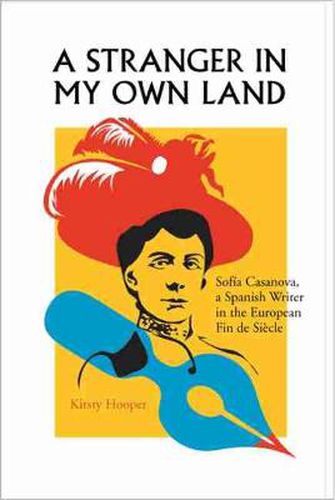Readings Newsletter
Become a Readings Member to make your shopping experience even easier.
Sign in or sign up for free!
You’re not far away from qualifying for FREE standard shipping within Australia
You’ve qualified for FREE standard shipping within Australia
The cart is loading…






This is the first in-depth analysis of the works of the Galician-Spanish expatriate writer Sofia Casanova (1861-1958), a transnational poet, novelist, journalist, playwright, campaigner, translator, historian and intellectual, and one of the first Spanish women to support herself as a professional writer. Casanova, born in Galicia in rural northwest Spain, married a Pole and spent over seventy years traveling between Spain and Poland. A challenging writer and thinker who witnessed the First World War, the Russian Revolution and the rise of Franco at first hand, moved in the highest political and intellectual circles on both sides of Europe and blazed a trail as one of Spain’s first female foreign correspondents, her remarkable achievements were gradually sidelined at home in increasingly reactionary Spain until, by the time of her death, she was remembered only as a perfectly patriotic wife and mother and icon of Francoist femininity.This study addresses the scandalous disappearance of Casanova and her female contemporaries from accounts of the emergence of the modern Spanish nation. Arguing that women’s perceived silence during this critical period in the formation of modern Iberian identities has significant repercussions even today, it takes her works as a case study for modeling a radical rethinking of the way we teach and research the crucial years around the turn of the twentieth century.The first study of Casanova’s radical and compelling, but now forgotten, early narrative, it explores the Galician, Polish and Spanish context of her work, arguing that her transnational career demonstrates the inadequacies of existing models of national literary history. At the same time, recognizing Casanova’s innovative and strategic use of literary genres and techniques traditionally denominated as ‘feminine’ (and therefore excluded from discussions of ‘serious’ national literature), it provides a model for re-evaluating the vast cultural store of popular and sentimental literature as a key part of the debates about the transition to modernity, in Spain and beyond.
$9.00 standard shipping within Australia
FREE standard shipping within Australia for orders over $100.00
Express & International shipping calculated at checkout
This is the first in-depth analysis of the works of the Galician-Spanish expatriate writer Sofia Casanova (1861-1958), a transnational poet, novelist, journalist, playwright, campaigner, translator, historian and intellectual, and one of the first Spanish women to support herself as a professional writer. Casanova, born in Galicia in rural northwest Spain, married a Pole and spent over seventy years traveling between Spain and Poland. A challenging writer and thinker who witnessed the First World War, the Russian Revolution and the rise of Franco at first hand, moved in the highest political and intellectual circles on both sides of Europe and blazed a trail as one of Spain’s first female foreign correspondents, her remarkable achievements were gradually sidelined at home in increasingly reactionary Spain until, by the time of her death, she was remembered only as a perfectly patriotic wife and mother and icon of Francoist femininity.This study addresses the scandalous disappearance of Casanova and her female contemporaries from accounts of the emergence of the modern Spanish nation. Arguing that women’s perceived silence during this critical period in the formation of modern Iberian identities has significant repercussions even today, it takes her works as a case study for modeling a radical rethinking of the way we teach and research the crucial years around the turn of the twentieth century.The first study of Casanova’s radical and compelling, but now forgotten, early narrative, it explores the Galician, Polish and Spanish context of her work, arguing that her transnational career demonstrates the inadequacies of existing models of national literary history. At the same time, recognizing Casanova’s innovative and strategic use of literary genres and techniques traditionally denominated as ‘feminine’ (and therefore excluded from discussions of ‘serious’ national literature), it provides a model for re-evaluating the vast cultural store of popular and sentimental literature as a key part of the debates about the transition to modernity, in Spain and beyond.